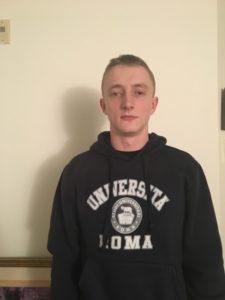
Davis Apitz, a young man with his whole life in front of him, hit rock bottom a year ago, in December of 2015. That was when he finally came to grips with the fact that his heroin addiction was beginning to destroy his life — and any of the grand dreams he ever had for his future. It wasn’t just the self-described “close call” with law enforcement in December 2015. It wasn’t the times he questioned himself. It wasn’t even his repeated failed attempts to kick heroin. It was something much more personal.
“My lowest point,” he says, “was the feeling of helplessness. It was in June of 2015 that I felt, for the very first time, that I was in trouble.”
A resident of Covington, Wash., Davis admits that what led him to this point was a “steady progression” of substance use from a very early age, including cigarettes, marijuana, prescription medications and then on to methamphetamines and heroin in 2013.
Soon after, recalls Davis, things were out of his control, a time he says today was “not fun.”
There were times he tried to kick the addition on his own, always being pulled back into the grips of the drug. There was that run in with law enforcement, of course, and the countless times he found himself in less-than-ideal places. His use had come so close to home, that his mother was forced to ask him to leave her home.
“Getting kicked out by my mother was one of the worse feelings I’ve ever experienced,” he recalls today. “I felt betrayed. At the time, I couldn’t grasp that what she was doing was trying to save my life.”
The more he spiraled, the worse things got. Finally, a confluence of events in 2015, including the close call with a police officer, the real and frightening threat of being homeless and, most importantly, the realization that he was a heroin addict, revealed that it was time for things to change for Davis.
In February 2016, David sought inpatient substance use treatment at the Kitsap Recovery Center.
“Kicking heroin was without a doubt the single hardest thing I’ve ever done,” he recalls from his efforts to get clean. “The withdrawals are the most miserable feeling imaginable. Nothing but contradictions — like your body is fighting itself. You’re starving but nauseous, exhausted but can’t sleep; and it’s called being sick because everything your body can throw at you … it does, from the body aches to the vomiting.”
After being discharged, Davis was referred to Sound Mental Health’s Auburn location for outpatient substance use treatment.
“Once I got through that (inpatient treatment) I had to face the reasons why I used in the first place,” he confides, adding “and that was even scarier. Outpatient treatment through Sound Mental Health helped me do that.”
According to Marissa Michalke, MSW MHP, CDP, his clinician at SMH, Davis presented initially with shattered self-confidence, given his repeated failed attempts to get clean. During his time at SMH, he received intensive outpatient care three times a week which included individual therapy, substance use counseling and group therapy to maintain his recovery.
“It went great,” he says now. “It was exactly what I needed. The therapy and groups gave me accountability and a sense of purpose in my early recovery.”
Of course it wasn’t easy. Davis admits that there were struggles and that, early on, it was extremely difficult to stick with his recovery plan, but the one thing he holds dear is the simple tenet and belief that we are connected to others.
“I believe the most important thing for anyone in early recovery is to create accountability, make yourself accountable to as many people as possible. Make commitments to people and honor them, have people that expect you to check in with them often so that if you start to slip, they can catch you before you relapse.”
Though services at SMH were initially intensive for him, today Davis requires less support and is able to rely on his strong sense of ownership over his healing, a connection to others here and a strong foundation for his recovery.
“My experience here is a really positive one,” he proudly says. “It’s had a good impact on my recovery. This is a place I feel safe to come to and tell how I was feeling.”
Frequently engaging with others through recovery and treatment groups, Davis is committed to expanding his message of recovery through advocacy, because he believes recovery is possible and there is hope for those struggling with mental health or substance use issues.
“One thing I’ve learned (about) getting clean is that the most important thing I can do is share my story, if it helps even one person stay clean for one day then I’ve saved a life.”